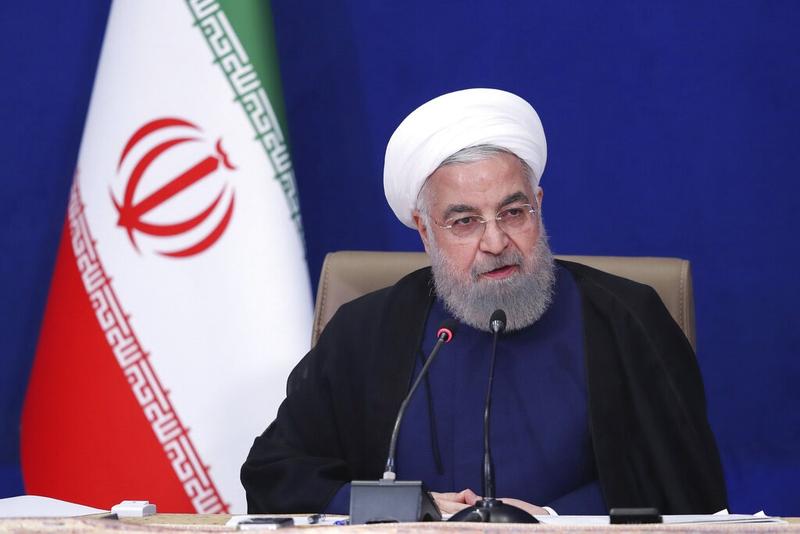 In this photo released by the official website of the office of the Iranian Presidency, President Hassan Rouhani speaks during a meeting at the presidency compound in Tehran, Iran, July 6, 2021. (PHOTO / IRANIAN PRESIDENCY OFFICE VIA AP)
In this photo released by the official website of the office of the Iranian Presidency, President Hassan Rouhani speaks during a meeting at the presidency compound in Tehran, Iran, July 6, 2021. (PHOTO / IRANIAN PRESIDENCY OFFICE VIA AP)
DUBAI - Iran said on Wednesday it could enrich uranium up to 90 percent purity - weapons grade - if its nuclear reactors needed it, but added it still sought the revival of a 2015 deal that would limit its atomic activities in return for a lifting of sanctions.
President Hassan Rouhani's remark is his second such public comment this year about 90 percent enrichment - a level suitable for a nuclear bomb - underlining Iran's resolve to keep breaching the deal in the absence of any accord to revive it.
The Iran nuclear deal caps the fissile purity to which Tehran can refine uranium at 3.67 percent, well under the 20 percent achieved before the agreement and far below the 90 percent suitable for a nuclear weapon
The biggest obstacle to producing nuclear weapons is obtaining enough fissile material - weapons-grade highly enriched uranium or plutonium - for the bomb’s core.
Iran says it has never sought nuclear weapons.
"Iran's Atomic Energy Organisation can enrich uranium by 20 percent and 60 percent and if one day our reactor needs it, it can enrich uranium to 90 percent purity," Rouhani said at a cabinet meeting, Iranian state media reported.
The nuclear deal caps the fissile purity to which Tehran can refine uranium at 3.67 percent, well under the 20 percent achieved before the agreement and far below the 90 percent suitable for a nuclear weapon. Iran has long denied any intention of developing nuclear weapons.
ALSO READ: IAEA: Iran has taken steps to make enriched uranium metal
Iran has been breaching the deal in several ways after the United States withdrew from the agreement in 2018, including by producing 20 percent and 60 percent enriched uranium.
Tehran and Washington have been engaged in indirect talks, which started on April 9 in Vienna aimed at bringing back the arch foes into full compliance with the accord.
The talks in Vienna adjourned on June 20 and no date has been set yet for the next round of the negotiations. Iranian and Western officials have said that significant gaps still remain to be resolved.
READ MORE: Iran says not in a hurry to revive nuclear deal under current govt
Two senior Iranian officials told Reuters that president-elect Ebrahim Raisi, who will take over the presidency from Rouhani on Aug 5, planned to adopt "a harder line" in the talks after taking office, adding that the next round might resume in late September or early October.
One of the officials said many members of Iran's nuclear team might be replaced with hardline officials, but top nuclear negotiator Abbas Araqchi would stay "at least for a while".
The second official said Raisi planned to show "less flexibility and demand more concessions" from Washington such as keeping a chain of advanced uranium enrichment centrifuges in place and insisting on the removal of human rights and terrorism related US sanctions.
Trump blacklisted dozens of institutions vital to Iran's economy using laws designed to punish foreign actors for supporting terrorism or weapons proliferation.
Removing oil and financial sanctions is essential if Iran is to export its oil, the top prize for Tehran for complying with the nuclear agreement and reining in its atomic program.


